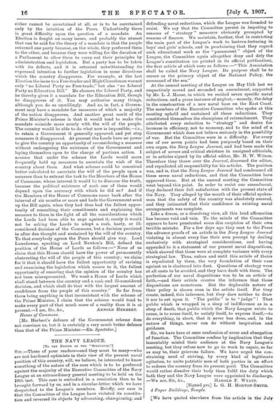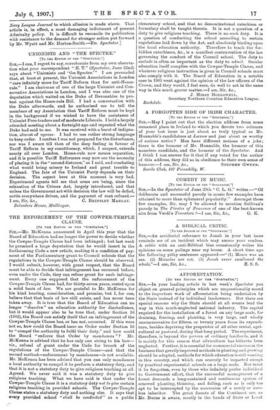THE NAVY LEAGUE.
rr0 THE EDITOR OF THE "SPECTATOR:] SIR,—Those of your readers—and they must be many—who are not hardened optimists in their view of the present naval position of this country, will, we believe, be interested to know something of the nature of the case which is to be preferred against the majority of the Executive Committee of the Navy League at an extraordinary general meeting to be held on the 19th inst. This case is embodied in a resolution then to be brought forward by us, and in a circular-letter which we have despatched to the League's members. Briefly, our case is that the Committee of the League have violated its constitu- tion and reversed its objects by advocating, championing, and
defending naval reductions, which the League was founded to resist. We say that the Committee persist in imputing to reasons of " strategy " measures obviously prompted by reasons of finance. We maintain, further, that in restricting the main part of the League's work to lantern-lecturing in boys' and girls' schools, and in proclaiming that they regard such educational work as the "paramount" object of the League, the Committee again altogether deny and defy the League's constitution (as printed in its official publication), the first article of which runs as follows :—" This Association shall be called the Navy League. Its purpose shall be to secure as the primary object of the National Policy, the command of the sea."
At the annual meeting of the League on May 15th last we respectively moved and seconded an amendment, supported by Mr. L. J. Maxse, in which we recited seven specific naval reductions, and a gross instance of neglect,—namely, the delay in the construction of a new naval base on the East Coast. The members of the Executive Committee who' spoke at this meeting upheld and sustained all these reductions. They constituted themselves the champions of retrenchment. They attributed every reduction to "strategy" and desire for increase in efficiency, not to economy, and to the mind of a Government which does not believe seriously in the possibility of war. But the Committee were in a difficulty. For every one of our seven points had been purposely based on their own organ, the Navy League Journal, and had been made the subject of severe and critical stricture in unsigned editorials, or in articles signed by its official editor, Mr. H. W. Wilson. Therefore they threw over the Journal, disowned the editor, and repudiated all responsibility for his articles. The position was, and is, that the Navy League Journal had condemned all these seven naval reductions, and that the Committee have approved them. But at the annual meeting the Committee went beyond this point. In order to resist our amendment, they declared their full satisfaction with the present state of the Navy. They alleged by the mouth of their official spokes- man that the safety of the country was absolutely assured, and they intimated that their confidence in existing naval arrangements was complete.
Like a dream, or a dissolving view, all this loud affirmation has become void and vain. To the minds of the Committee appears to have penetrated some dim suspicion of their own terrible mistake. For a few days ago they sent to the Press the advance proofs of an article in the Navy League Journal violating in almost every line their own precept by dealing exclusively with strategical considerations, and having appended to it a statement of our present naval dispositions, which showed that these were at complete variance with every strategical law. Thus, unless and until this article of theirs is repudiated by them, the very foundation of their case against us is shattered into dust. Questions of strategy were at all costs to be avoided, and they have dealt with them. The perfection of our naval dispositions was to be an article of faith,—and their article creates the inference that those dispositions are monstrous. But the deplorable nature of their policy is shown even in the article itself. For they create, indeed, this inference, but they dare neither to draw it nor to act upon it. "The public" is to "judge " ! That public which is wrapped in a sleep of indifference as in a sleep of death, that public which the Navy League exists to rouse, is to rouse itself, to satisfy itself, to express itself,—to do everything, in short, that it never has done, and, in the nature of things, never can do without inspiration and guidance.
Sir, we have here at once confession of error and abnegation of function. The Committee confess by implication that they lamentably misled their audience at the Navy League's meeting, but they refuse now to go to work to repair, so far as may be, their grievous failure. We have urged the con- straining need of striving, by every kind of legitimate agitation, to unite patriotic men of both parties in an effort to redeem the country from its present peril. The Committee would rather dissolve their body than fulfil the duty which both they and the Navy League were appointed to discharge.
—We are, Sir, Sze., Haltom) F. WYATT. [Signed pro] L. G. H. HoitTox-SmiTH. 4 Paper Buildings, Temple.
[We have quoted elsewhere from the article in the July Navy League Journal to which allusion is made above. That article is, in effect, a most damaging indictment of present Admiralty policy. It is difficult to reconcile its publication with resistance to the demand for stronger action put forward by Mr. Wyatt and Mr. Horton-Smith.—ED. Spectator.]















































 Previous page
Previous page